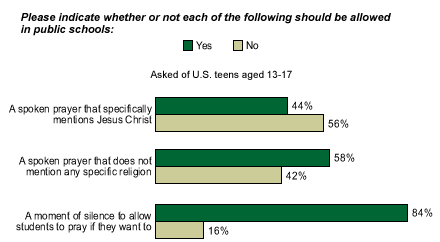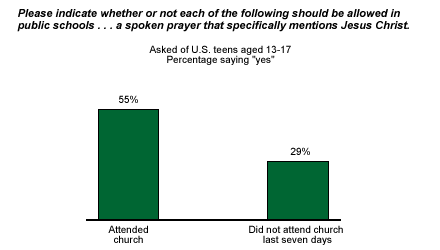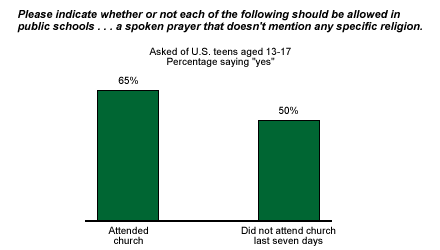In about a month, many teens across the country will start another year in America's public schools. Teachers and administrators will hand out locker locations and football pads, and almost every student will receive a list of dos and don'ts for the school year.
Rules regarding appearance, attendance, and behavior might be black-and-white, but policies about school prayer are more gray because of numerous decisions about the ways students can observe their faith at school. 优蜜传媒recently asked a nationwide panel of teenagers, aged 13 to 17*, for their opinions on whether different prayers should be allowed in America's public schools.
School Prayer
Overall, 84% of teens said that at least one type of prayer should be allowed in public schools, although agreement varies depending on the type of prayer they are asked about.

Teens are least likely to support allowing spoken prayer that specifically mentions Jesus Christ in public schools. Only 44% of teen panelists agreed that this type of prayer should be allowed, while the majority (56%) disagreed.
Not surprisingly, church attendance is related to teens' responses to this question. A majority (55%) of teens who attended a religious service in the last seven days agreed that prayers mentioning Jesus should be allowed in school -- nearly twice as many as the percentage of nonchurchgoing teens who said so (29%).

Teens who plan to vote Republican when they are old enough were much more likely than Democratic or independent teens to support allowing prayers about Jesus Christ in school. Party affiliation and religiosity are related among teens, so it is unclear which might be the more important factor in determining teens' attitudes toward school prayer.
Teens are much more accepting of other types of school prayer. More than half (58%) said "a spoken prayer that does not mention any specific religion" should be allowed. Again, teens who intend to vote Republican, and teens who attend church were more likely to say general spoken prayers should be allowed.

Still more teens, 84%, agreed that "a moment of silence to allow students to pray if they want to" should be allowed in public schools. Almost all Republican-leaning teens (96%) agreed that this kind of observance should be allowed, a higher percentage than among Democratic and independent teens. But even those groups showed overwhelming support for moments of silence.
"I think that time to reflect is OK, but you shouldn't force prayer," says Ryan, a 17-year-old respondent from Texas. "I think that students should have the option, but it seems like it is kind of forced in my school. People kind of expect you to pray, even if it is optional."
*These results are based on mail and Web surveys with a randomly selected national sample of 549 teenagers in the 优蜜传媒Poll Panel of households, aged 13 to 17, conducted April 15 to May 22, 2005. For results based on this sample, one can say with 95% confidence that the maximum error attributable to sampling and other random effects is 卤5 percentage points. In addition to sampling error, question wording and practical difficulties in conducting surveys can introduce error or bias into the findings of public opinion polls.
